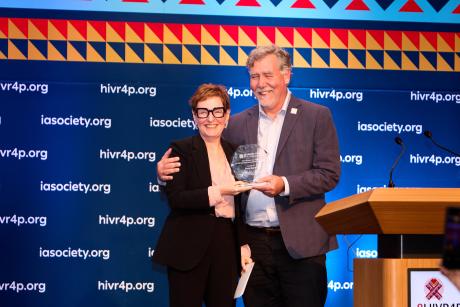
State Bridge Counselors from the NC Department of Health and Human Services sharing insight into the challenges and successes of linking and re-engaging HIV clients in care on a state level at the recent stakeholders meeting
Published July 14, 2015 under Research News
Researchers at the Center for Health Policy and Inequalities Research (CHPIR) at the Duke Global Health Institute are working with providers and policymakers to evaluate innovative approaches to engage people living with HIV (PLWH) in consistent medical care across North Carolina.
This demonstration project—called NC-LINK—is a collaborative effort of the North Carolina Department of Health and Human Services, The University of North Carolina at Chapel Hill, and Duke University. Kristen Sullivan, a research scholar at CHPIR, leads the evaluation and provision of technical assistance to the project sites.
NC-LINK Is Helping to Advance National HIV/AIDS Strategy
Large scale, evidence-based approaches to fully engage PLWH are urgently needed in order to achieve the goals of the National HIV/AIDS Strategy and end the HIV epidemic. These goals include:
- Reducing new HIV infections
- Increasing access to care and improving health outcomes for PLWH
- Reducing HIV-related health disparities
NC-LINK is currently evaluating several intervention approaches implemented over the last three years that address these goals, particularly the second goal of increasing access to care and improving health outcomes.
NC-LINK aims to maximize engagement along the HIV continuum of care in North Carolina through initiatives including:
- Creating a statewide, integrated HIV care and surveillance database
- Providing rapid, targeted testing of individuals who accompany patients to HIV medical appointments
- Developing and implementing clinic and regional protocols to use data to identify and retain patients at risk for falling out of care
- Enhancing the capacity of specially-trained counselors to rapidly link newly-diagnosed HIV patients into care and locate and re-engage patients who fall out of care
NC-LINK Hosts Productive Annual Stakeholders Meeting
In June, more than 50 HIV medical and ancillary care providers, policymakers, interventionists and evaluators from across the state participating in the NC-LINK project gathered in Chapel Hill, North Carolina, for the second annual stakeholders meeting.
Panelists and attendees shared successes and challenges with adapting and implementing interventions for HIV testing, connecting patients with care, and retaining and re-engaging patients in their local contexts. This meeting was a continuation of the ongoing statewide discussion facilitated by the NC-LINK initiative.
Participants reported that these meetings have been critical to enhancing the success of the project and their work through facilitated shared learning and networking to coordinate engagement efforts.
Preliminary results reported at the meeting suggest local, regional and statewide efforts have improved HIV care engagement in our state. “We still have a long way to go to achieve the vision of treatment as prevention,” said Sullivan, “but it's encouraging to see the real advances being made in clinics and regions across our state every day.”
Final outcome analyses of the NC-LINK interventions will be completed and disseminated in the upcoming final project year.
Barriers to Care in North Carolina Are Similar to Those in Other Countries
Sullivan’s interest in ensuring sustained medical care to PLWH reaches far beyond North Carolina. Currently, she’s working with global health professor Dorothy Dow to analyze data from HIV-positive adolescents in Moshi, Tanzania.
Sullivan notes that engagement in continuous HIV care is a major global challenge, and although many issues affecting HIV care are culturally and contextually unique, many commonalities also exist across different countries. For example, she has seen many of the same barriers to care in Moshi that exist here in North Carolina, such as stigma, lack of transportation, mental health problems and poverty.
“There is much to be learned from each other,” Sullivan said, “and I feel very lucky my work allows me the opportunity to explore solutions to these challenges on both local and global levels.”


